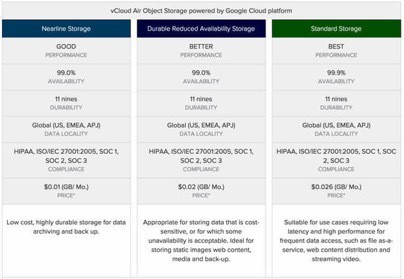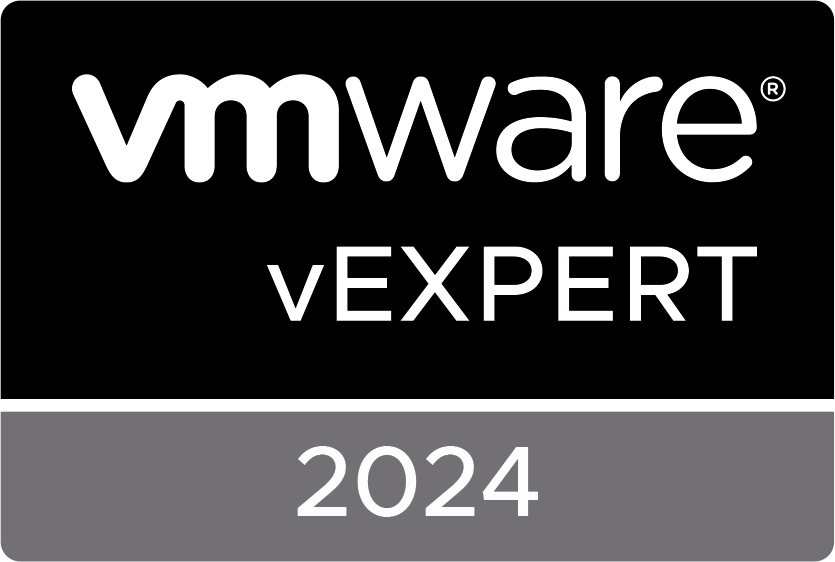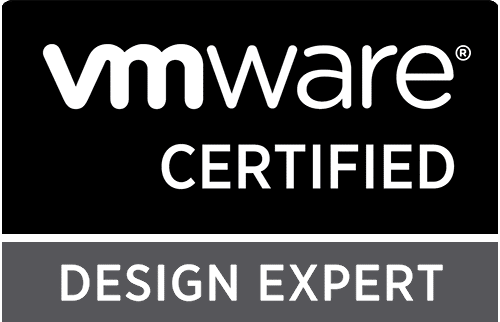vCloud Air was introduced by VMware in 2013 by VMware – initially under the name vCloud Hybrid Service (vCHS) – as a public cloud IaaS (Infrastructure as a Service). After two years of development and improvement, VMware is, in my opinion, successful in putting their public cloud distinctively in the market. vCloud Air focuses primarily on customers who are already using VMware technology in their corporate data centers. In addition, VMware made the underlying infrastructure of vCloud Air (vSphere and vCloud Suite) high available. AWS, for example, has the vision you should solve high availability at the application layer, where VMware focuses on making the underlying infrastructure high available. Reality today shows that but a few company applications are able to properly deal with a failing infrastructure. If you are using VMware technology in your corporate data centers and you want to consolidate (parts of) your virtual infrastructure into a public cloud, then vCloud Air should be the first service to be considered.
Contrary to what was published in a recent (unconfirmed) rumor on a technology news website, VMware hugely invests in vCloud Air. At VMworld 2015, many new features and changes were announced for this service, all contributing to the realization of the VMware’s Hybrid Cloud vision. Below you’ll find, in more or less detail, the key announcements of vCloud Air at VMworld 2015:
VMware vCloud Air Disaster Recovery (DR) Services
Previously, the DR service of vCloud Air was only available on a ‘subscription’ base. This meant you purchased a fixed amount of ‘standby’ resources at a fixed price. The pricing model for DR is now replaced by a ‘pay-for-what-you-consume’ pricing model. A flat-rate fee per VM will be charged for the replication of the VM; additionally you only pay for the amount of compute resources you consume after a DR. This new pricing model makes starting with vCloud Air DR easier and cheaper for customers.
Further DR developments have lead VMware to announce a new SaaS that allows for automating and orchestrating DR plans in a simple way: VMware Site Recovery Manager Air. An important feature of SRM Air is support for failback. After a DR it is crucial to migrate back to your own datacenter in a simple and fast way (once it is available again). VMware has learned important lessons in this area. In the first release of vCloud Air DR (in combination with vSphere Replication) there was no native failback possible. To migrate back to your own data center a failovered VM had to be turned off and you had to perform an offline migration using the vCloud Connector. This made the service virtually useless for customers. Luckily VMware has realized this and the service now supports a full failback.
VMware vCloud Air Object Storage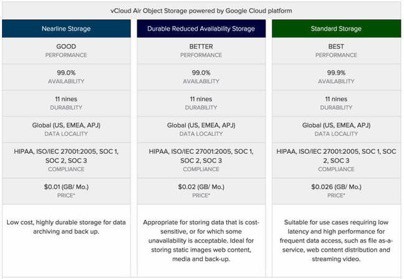
For storing multiple terabytes of unstructured data, vCloud Air customers can now use vCloud Air Object Storage. VMware offers the customer a choice between a transparent integration with the Google Cloud Platform public cloud service or landing on a private cloud based on EMC’s software defined storage platform, EMC ViPR.
The Google Cloud Platform offers customers a choice of three flavors Object Storage depending on performance and availability requirements:
- Standard storage for best performance
- Durable Reduced Availability Storage for a lesser availability
- Nearline Storage for low-cost archiving
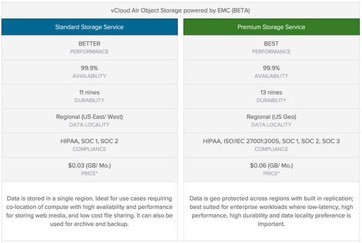
EMC ViPR based Object Storage also has another two options to offer:
- Standard Storage for a single-region solution with high durability of 11 nines.
- Premium Storage for a geo-replicated solution across multiple regions with extreme durability of 13 nines.
The Google Cloud Platform option is available today. The EMC ViPR variant is currently in beta. More details will undoubtedly follow in the near future!
VMware vCloud Air SQL
VMware now offers DataBase as a Service (DBaaS) service with the introduction of vCloud Air SQL. With this service, customers can quickly and efficiently use scalable SQL databases with vCloud Air. Currently this service is available in a so-called Early Access Program.
VMware vCloud Air Advanced Networking Services
Advanced Networking Services has been aanounced a while ago by VMware as part of the ‘One cloud, any app, any device’ campaign in February 2015. This important expansion of vCloud Air has finally been made available to the general public. Advanced Networking Services in vCloud Air bring some key features of VMware’s network virtualization product NSX to vCloud Air. The most striking features are the ability to implement a ‘zero-trust security model’ due to micro-segmentation and the support of dynamic routing using standard industry protocols such as OSPF and BGP.
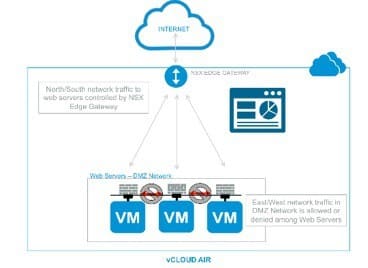 Using micro-segmentation, firewall policies can be applied on the virtual NIC(‘s) of virtual servers. For example, VMs in a secure DMZ network can be in the same network segment without having layer-two access to each other. In many traditionally-built data centers, networks are divided into three layers: presentation-, application- and data-layer. Between these layers often firewalls are active to regulate traffic between them. Micro-segmentation can prevent various systems within the same network layer accessing each another.
Using micro-segmentation, firewall policies can be applied on the virtual NIC(‘s) of virtual servers. For example, VMs in a secure DMZ network can be in the same network segment without having layer-two access to each other. In many traditionally-built data centers, networks are divided into three layers: presentation-, application- and data-layer. Between these layers often firewalls are active to regulate traffic between them. Micro-segmentation can prevent various systems within the same network layer accessing each another.
Even more, Advanced Networking Services offer improvements to load balancing, SSL, VPN and can easily be scaled up to 200 virtual networks.
A final important fact: Advanced Networking Services are currently only available for Dedicated Cloud customers. These services are not available in the Virtual Private Cloud variants of vCloud Air.
VMware vCloud Air Hybrid Cloud Manager
Hybrid Cloud Manager is a new management product for vCloud Air. It provides a simple solution for managing vCloud Air resources from the vSphere Web Client and offers customers a unified management solution for both on-premises and cloud resources.
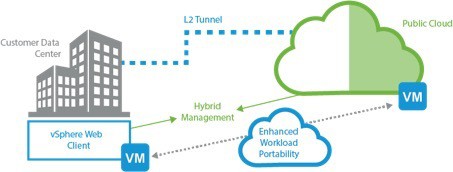 Hybrid Cloud Manager also features a number of advanced network technologies allowing to extend networks to vCloud Air using a Layer 2 VPN Data Center Extension by pulling vCloud Air, thus providing a seamless extension of the local vSphere data center. Choices are Hybrid Networking Standard and Premium: the main differences are the number of vCenter connections (1 vs. 3), and the available bandwidth (100Mpbs vs. 1Gbps).
Hybrid Cloud Manager also features a number of advanced network technologies allowing to extend networks to vCloud Air using a Layer 2 VPN Data Center Extension by pulling vCloud Air, thus providing a seamless extension of the local vSphere data center. Choices are Hybrid Networking Standard and Premium: the main differences are the number of vCenter connections (1 vs. 3), and the available bandwidth (100Mpbs vs. 1Gbps).
Hybrid Cloud Manager also offers advanced cloud migration technologies. WAN acceleration enables efficient replication of workloads to and from vCloud Air. During replication a virtual server can be active; a shutdown is only needed when a ‘switchover’ occurs. This is a huge improvement over the completely offline migration offered by vCloud Connector.
Technology Preview – Project SkyScraper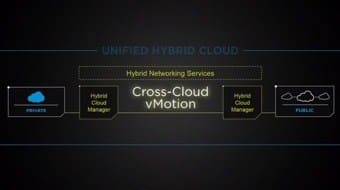
‘Project SkyScraper’ technology will ensure in the near future that virtual servers can be migrated without downtime to and from vCloud Air: a Cross-Cloud vMotion! More on this in a next blog!
Finally, I would like to mention the ‘Project SkyScraper’ feature called Content Sync. This feature allows customers to subscribe vCloud Air to a vSphere Content Library thus enabling you to seamless sync things like templates, vApps and ISOs between the local data center and vCloud Air.
I can only conclude that, with all these new features and enhancements, VMware has full focus on vCloud Air. According to VMware’s vision the Hybrid Cloud is the ideal end state and VMware vCloud Air plays a huge role in realizing that vision. I certainly can’t wait for these nice improvements so I can get started with them at our clients!
Google Cloud Services
As you may know, VMware and Google are in an extensive partnership. Lot’s of Google Cloud Platform services are being leveraged through vCloud Air. At VMworld 2015 Europe a couple of new services were announced ‘generally available’. Google Global DNS, Google Cloud Datastore and Monitoring Insights on VMware vCloud Air.
vCloud Director 8.0
Whilst not really being a vCloud Air announcement, I feel I should also mention the release of vCloud Director 8.0. vCD is VMware’s cloud platform offering for service providers. vCloud Air is built on top of it and vCloud Air Network Partners are also leveraging it to deliver cloud services.
